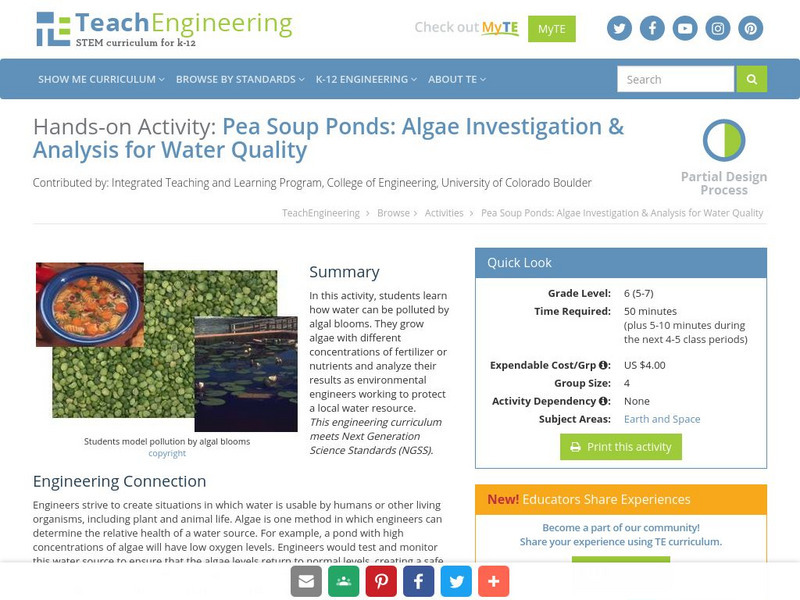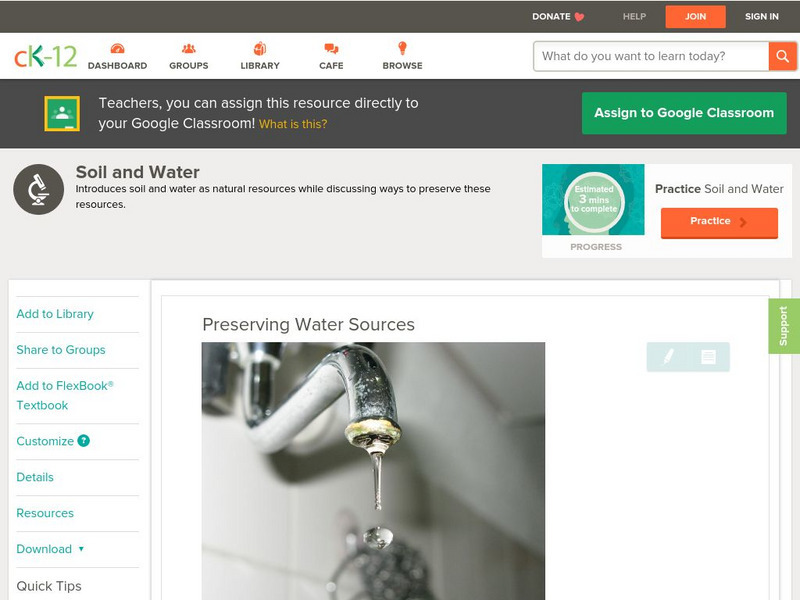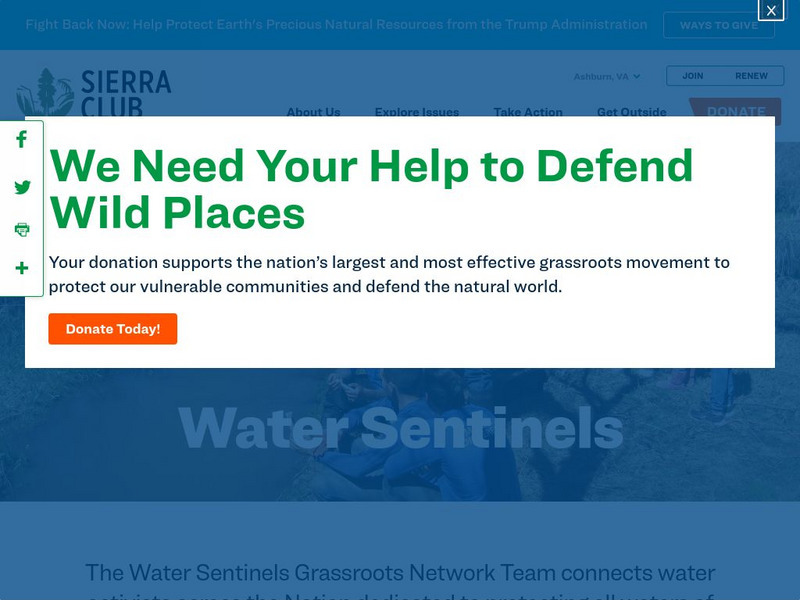TeachEngineering
Teach Engineering: Pea Soup Ponds
In this activity, students will learn how water can be polluted by algal blooms. They will grow algae with different concentrations of fertilizer or nutrients and analyze their results as environmental engineers working to protect a...
TeachEngineering
Teach Engineering: Stream Consciousness
During this activity, students will learn how environmental engineers monitor water quality in resource use and design. They will employ environmental indicators to assess the water quality of a nearby stream. Students will make general...
TeachEngineering
Teach Engineering: How Clean Is That Water?
This lesson plan helps students understand the factors that affect water quality and the conditions that allow for different animals and plants to survive. Students will look at the effects of water quality on various water-related...
TeachEngineering
Teach Engineering: Who's Down the Well?
Drinking water comes from many different sources, including surface water and groundwater. Environmental engineers analyze the physical properties of groundwater to predict how and where surface contaminants will travel. In this lesson,...
CK-12 Foundation
Ck 12: Life Science: Effects of Water Pollution
[Free Registration/Login may be required to access all resource tools.] Water pollutants can have an effect on both the ecology of ecosystems and on humans. As a result of water pollution, humans may not be able to use a waterway for...
CK-12 Foundation
Ck 12: Life Science: Preserving Water Sources
[Free Registration/Login may be required to access all resource tools.] It might seem like there is plenty of water on Earth, but that's not really the case. Water is a limited resource. That means that it is used faster than it is...
US Geological Survey
U.s. Geological Survey: Search
The U.S. Geological Survey offers information for teachers and students interested on Earth Science research. Contains references to general information as well as current research and events.
American Geosciences Institute
American Geosciences Institute: Slideshows for the Series: Water and the Environment
This page contains a collection of PowerPoint slideshows that explore water. Learn why water is important, why Earth is called the water planet, the parts of the water cycle, and the importance of water quality.
US Environmental Protection Agency
Epa: Ground Water and Drinking Water: Emergency Disinfection of Drinking Water
Learn about the public's drinking water, the oversight agencies that govern it, and what needs to be done in an emergency if it becomes contaminated.
Other
The Sierra Club: Clean Water
The Sierra Club, an environmental organization, provides detailed news and information regarding the current U.S. waters and wetland quality. Content includes overviews, factsheets, features, a quiz, and more.
US Geological Survey
Usgs: Water Quality of San Francisco Bay
This resource from the United State Geological Survey provides data about San Francisco Bay's water quality. Data is displayed in time series plots, vertical profiles, longitudinal sections, space and time contours, and x-y scatter plots.
Government of Alberta
Alberta Environment: Focus on Groundwater: Groundwater Basics [Pdf]
This article explains in detail what groundwater is, why it is important, human activities that affect its quality and quantity, and things we can do to protect it.
US Geological Survey
Usgs: Water Science for Schools Pesticides Ground Water
This US Geological Survey site briefly discusses the basics of why pesticides are increasingly found in our ground water. Click Home to access the site in Spanish.
Center for Educational Technologies
Exploring the Environment: Water Quality #2
Use this case study from the Wheeling Jesuit University and a real world type problem to learn about water pollution and water quality assessment. Lots of supporting material.
Other
Importance of Plants and Plant Communities
Discover why plants are extremely important to humans. Resource provides an explanation of the important things they provide.
CK-12 Foundation
Ck 12: Fifth Grade Science: Earth Science: Humans and the Water Supply
[Free Registration/Login may be required to access all resource tools.] Looks at ways that humans use water, why some people don't have enough water, and why poor quality water is a problem.
PBS
Nh Pbs: Nature Works: Estuaries
Learn more about estuaries when you visit this informative site. This resource provides locations of and weblinks to estuaries in the United States.
Alabama Learning Exchange
Alex: Fred the Fish a Little River Trip
Little River is home to 47 kinds of fish including the threatened "Blue Shiner" Cyprinella caerulea. These fish depend on the good water quality at Little River. This skit allows students to observe pollution's effects on a small scale...
Alabama Learning Exchange
Alex: Surface Water Testing
In this environmental science lab you will chemically test a nearby creek or pond for dissolved oxygen, pH, alkalinity, hardness and turbidity. This is a field test and will determine the water quality of standing body of water. The lab...
Environmental Education for Kids
Eek!: Teacher Resources: Critter Search
In this activity, students will identify aquatic insects and animals that live in a stream or river, learn about the water quality based on the type of macroinvertebrates collected, and return the collected critters to the water.
Environmental Education for Kids
Eek!: Community Action & Citizen Science: Adopt a Beach
Learn about a program in Wisconsin called Adopt-a-Beach. Schools, families, businesses and community groups adopt beaches and shoreline areas in their local community to conduct litter removal and monitoring and water quality testing.
PBS
Pbs Learning Media: Environmental Public Health: Human Impact on Water Quality
In this lesson, students explore human impact on water resources, investigate the quality of their community's water supply, and consider ways to clean up and avoid further pollution. (Note: Some of the links may no longer work and...
Science Education Resource Center at Carleton College
Serc: Mn Step: What Is in the Pond?
This is a scientific investigation where students establish what macro-invertebrates live in a local water habitat (stream, pond, aquarium), and predict how healthy the water is. They then test the water quality, record the data, and...
Science Education Resource Center at Carleton College
Serc: Mn Step: Where Shall We Go Swimming?
After analyzing samples of water from local lakes, students will perform tests on water from two locations, compare the results, and complete a lab report. They will then examine maps to determine factors that may have had an impact on...













![Alberta Environment: Focus on Groundwater: Groundwater Basics [Pdf] Handout Alberta Environment: Focus on Groundwater: Groundwater Basics [Pdf] Handout](https://d15y2dacu3jp90.cloudfront.net/images/attachment_defaults/resource/large/FPO-knovation.png)





